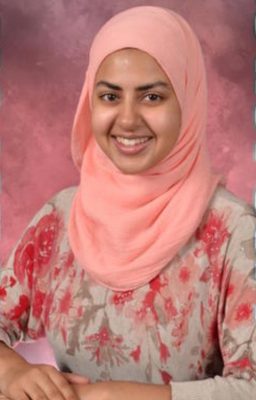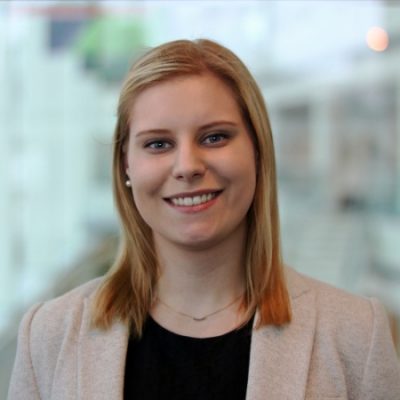 Dominika Lichomska, a junior pursuing a degree in Management Information Systems (MIS) with an Analytics Minor, has had a passion for Information Technology since her childhood. “I was highly fascinated about computers and what made them tick. Once I took several OPIM classes I realized that technology is equally interesting as it is challenging.” Because technology has become an integral aspect of modern day life and is constantly evolving, her MIS degree will help her succeed in any field she decides to work in.
Dominika Lichomska, a junior pursuing a degree in Management Information Systems (MIS) with an Analytics Minor, has had a passion for Information Technology since her childhood. “I was highly fascinated about computers and what made them tick. Once I took several OPIM classes I realized that technology is equally interesting as it is challenging.” Because technology has become an integral aspect of modern day life and is constantly evolving, her MIS degree will help her succeed in any field she decides to work in.
After transitioning from the Stamford campus to Storrs her sophomore year, she became involved in Health Care Management Society, Alpha Lambda Delta Honors Society, Hearts Over Latin America (HOLA), and Information Management Association (IMA). IMA was a great way for Lichomska to meet other students who are interested in MIS and share her passion for technology. “IMA was the perfect club to get me acclimated to the opportunities that MIS offers,” she said, and after just one semester she was elected as treasurer. “My main goal as Treasurer is to support the IMA EBoard in introducing the MIS field to undergraduate students, present technology opportunities, and connect students with working professionals.” In addition to IMA, she is also interested in attending the OPIM Innovate workshops so she can “further develop technology skills and knowledge.” With her experiences through the business school and prior work experience at The Center for Women’s Heath, she decided to combine the interests and join Health Care Management Society. Although Lichomska stays involved within the business school and the OPIM Department, she also makes sure to lend a helping hand through HOLA. HOLA designs campaigns that will have a sustainable impact in public health and education in Latin America. Even with this broad array of clubs, societies, and organizations outside of the classroom, her main goal after attending the University of Connecticut is simple, to “learn a lot, meet some friends, and make great memories.”
“I adore that UConn not only focuses on the knowledge that MIS majors could benefit from but also the history and logic behind them. For example, in my advanced business application development class, before learning how to code in C# we learned the history of computers and the logic behind the language.” This background knowledge is helpful to gain a deeper understanding of topics in class that may be difficult to grasp, and will help prepare students for their careers. Although Lichomska may not know what her future holds, she has been most interested in the concept of gamification. “Gamification includes the process of using objectives and rules, while taking into consideration intrinsic motivations, to apply a gaming environment into non-game contexts.” In the future, she would enjoy working in an industry where the gamification concept is used to help solve industry obstacles. It is the opportunities within the department, such as the courses and workshops, that helped Lichomska intern with M2 Media group, a magazine subscription agency, located in Stamford, CT. “During my internship I learned about the magazine industry, how to efficiently coordinate with many company departments, and edit magazine descriptions. I was able to polish my Microsoft Excel and communication skills. Communication is important especially for business majors and my internship with M2 Media Group has introduced me to the art of business communication.”
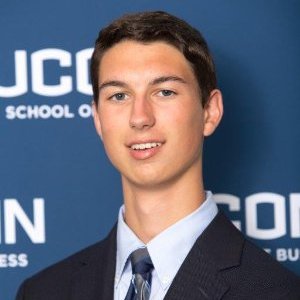
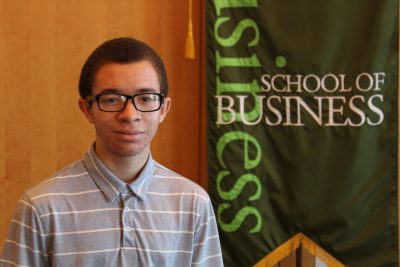
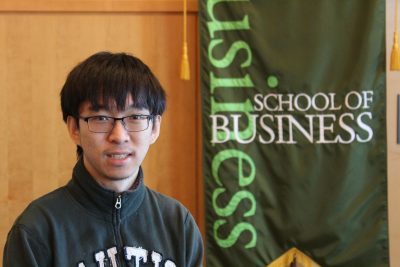
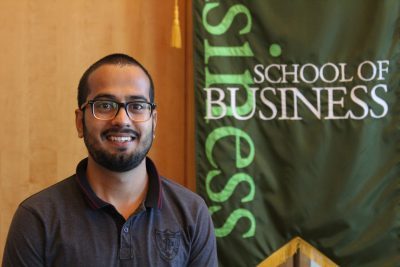
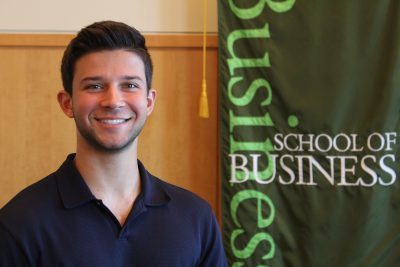 “The trick is to accomplish great things while balancing what you love and not working yourself to death,” said
“The trick is to accomplish great things while balancing what you love and not working yourself to death,” said  For junior Management Information Systems (MIS) major, TJ Hannon, Information Technology (IT) is in his blood. His father, who works in IT, got TJ started with his first computer running Windows 98 at a very young age and since then he’s never looked back. Multiple business courses taken during high school ignited his interest in business as well. These two passions led TJ to research programs online and ultimately find University of Connecticut’s MIS major, as he describes it “the perfect cross between a computer and a business degree”.
For junior Management Information Systems (MIS) major, TJ Hannon, Information Technology (IT) is in his blood. His father, who works in IT, got TJ started with his first computer running Windows 98 at a very young age and since then he’s never looked back. Multiple business courses taken during high school ignited his interest in business as well. These two passions led TJ to research programs online and ultimately find University of Connecticut’s MIS major, as he describes it “the perfect cross between a computer and a business degree”.